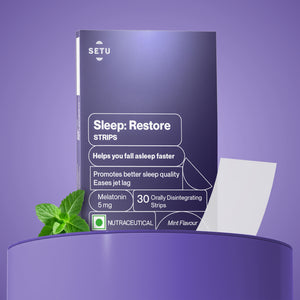How can I tell if the Supplements I take are safe?
04 Jun 2021
How can I tell if the Supplements I take are safe?
An inside view of regulation in the supplement industry
Perceptions about food and supplements regulation often operate at extremes. While many believe that each food product goes through a rigorous review and approval by the government, others believe that there is no process at all, and also that the law has neither the capacity nor the intent to punish those who violate it.
No regulation—No standards—No safety.
Unfortunately for me, the latter couldn’t be further from the truth.
Dietary supplements are regulated by the Food Safety and Standards Authority of India; you’ve probably heard of them as the FSSAI. The good people over there have spent decades developing a clear regulatory policy towards supplements. To be honest, it’s both pretty good and pretty darn rigorous. It simultaneously stays true to the Indian state’s inherent desire to parent consumers and companies while allowing room for innovation and creative freedom.
The FSSAI regulates the industry through its main set of laws and regulation that cover three key aspects of food safety:
- Comprehensive rules for the manufacture and sale of health supplements and affiliated categories.
- Laws relating to the essential composition of the products, including claims, labelling, use of additives and limits of contaminants, toxins and residues.
- Pages of schedules that list all the ingredients, vitamins, minerals, probiotics, prebiotics and even additives that can and cannot be used, alongside recommended diets and daily allowances when relevant.
The FSSAI constantly updates and modifies these regulations, and the onus of compliance is on brands and manufacturers, like Setu.in! Admittedly, dietary supplements are not required by law to go through the same kind of testing as pharmaceutical products. This is because dietary supplements are composed of naturally occurring ingredients that have a long and safe history of usage in food, while novel pharmaceutical products have often never-before been introduced into the human body—the latter have much more rigorous regulations.
Nonetheless, SETU and I are legally liable for our products and labels, and will be in serious trouble if we digress from the permitted regulations. As such, our approach to product development involves making sure we are 100% compliant at all stages.
 |
 |
 |
 |
 |
 |
Here’s how development works at Setu, succinctly:
- We start with a health problem and a statement: “My eyes are often tired and my head also usually hurts”.
- Then we work backwards with our scientists to understand the biomechanisms that manifest tiredness in the eyes, thereby causing headaches.
- The next step is a deep literature review to find nutrients that can counter these disturbances. We make a long list of those nutrients and their clinically valid dose used peer-reviewed studies.
- Once the list of nutrients is made, we review each of them against the permitted FSSAI regulations, filtering out the ones that don’t comply.
- We incorporate them into a formula—a capsule, drink, effervescent, or gummy—and then begin to look for an appropriate manufacturing partner.
- All of our manufacturers are Good Manufacturing Practice (GMP) compliant and are vetted multiple times by both myself and our QA teams in-person. They have their own, excellent scientists and often help us tweak and iterate our formula to make sure it is both compliant and well suited for our target audience.
- Finally, the actual manufacturing begins. Once the product is ready, each of our manufacturers runs multiple tests including checks for heavy metals, microbial analysis, and the very important actual formulation analysis—this validates that the product does indeed contain what is claimed on the label.
After this gruelling process, we are almost ready to launch! The testing, however, still doesn’t stop. Our products and formulas all go into a stability facility where they are stored at a range of temperatures and humidities, and they are regularly tested at intervals by third party labs to assure us that they are meeting claims and expiry timelines made on our labels.
Of course, FSSAI regulations stipulate that all this SHOULD be done in the process of creating and launching a new product. And the law has penalties for those that do not abide by the process. But enforcement can often be found wanting—we live in a big country!—and the burden of compliance almost always falls on brands and manufacturers. As such, the actual quality of the product is based on the honor of the producer.
Recently, Amazon has reduced the costs of entry into the market so dramatically, that you can often watch a new supplement company pop up with each passing day, with new fly-by-night manufacturers popping up to meet this growing demand. Many of these producers and their products often flout industry regulations, because being compliant is an expensive process that requires actual investment into research, materials, and manufacturing. This is a challenge for us at SETU because we invest disproportionately in building quality products with industry-leading raw materials
All the same, we’ll never compromise on the quality of our products or the rigorous nature of our quality control, even if it means higher expenses. We’re also happy to be transparent to our customers about our manufacturing and compliance processes, because we know you will rest easier and healthier if you’re getting a product that you know only contains what’s good for you.
Sleep: Restore Strips- Melatonin 5 mg
- ₹424
- ₹424
-
₹550 - ( 22% OFF)
Categories
- Choosing a selection results in a full page refresh.
- Press the space key then arrow keys to make a selection.
this is the sidecart










